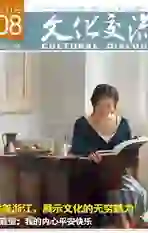汪飞白:远航诗海的老水手
2018-08-06徐忠友
徐忠友
风和日丽的一天,笔者走进了诗歌翻译家汪飞白先生的家。家中陈设简陋:墙是已经发黄的白灰壁,地上铺的是老款的红地砖;房中没有像样的家具,最好的东西就是他的一台笔记本电脑,最多的东西就是靠墙摆放的旧书架,加上许多散乱堆放的装书的纸板箱。整个环境很像堆货的港口码头或船甲板,而他也恰似一位准备出发航行的水手。
戎马生涯不忘文学情怀
1929年底,汪飞白出生在富有诗情画意的杭州西子湖畔,他父亲是1922年春与应修人、潘漠华、冯雪峰共同创办湖畔诗社的著名诗人汪静之,母亲符竹因也是写诗和小说的女作家。
汪飞白走上诗歌翻译之路,与生在诗人之家当然有关联。小时候父亲对他作“万般皆下品,唯有写诗高”的说教,在他10岁时就命其“立志当诗人”,这话却使儿子逆反,他暗中发誓“此生不当诗人”。但是飞白在家庭气氛熏陶下其实是爱诗的,由于决心不当诗人,他对诗的爱好就拐了个弯,在翻译介绍外国诗方面发挥出来了。
依靠广阔的另类学识以及翻译英文小说磨练出来的英文水平,1947年汪飞白报考浙大外文系名列前茅,还获得了全校唯一的一个“四年学杂费伙食费全免”的最高奖学金。
中华人民共和国成立初期,飞白响应号召赴北京学习俄语,又因苏联援华的军事专家随即到达,解放军各部急需翻译,就这样,他未从浙大毕业,就开始了长达30年的戎马生涯。
之后他的职务屡经变迁,但心中一直怀有浓浓的文学情怀。1955年起,飞白就开始译介外国诗歌名著,启锚驶向了浩瀚诗海。到了1980年,汪飞白终于得以辞去部队团政委的军职,以作家身份在杭州大学中文系任教,开始了自己的破冰之航,并开设了“世界名诗选讲”、“世界诗歌史”、“现代外国诗”等课程。
破冰从哪里开始?飞白选定英国维多利亚时代诗歌、法国波德莱尔和象征派诗歌、俄国白银时代诗歌这三大块,作为第一批急待翻译的名著。他日以继夜地同时在几条线上忙碌,他的新译源源不断地在刊物上出现,在青年读者群中掀起了一股热潮,也推动了翻译界大规模的译介工作。
同时飞白在杭大培养了一批批专业人才。1989年,两大卷、135万字的《诗海》出版,受到全国诗歌界和青年学生的热烈欢迎,获得中国图书奖一等奖,舆论界也从此给了飞白“诗海水手”和“探海者飞白”的昵称。
由于《诗海》的成功,飞白应邀参加1990年吉隆坡世界诗歌节。
诗海的麥哲伦环球之航
1991至1992年,汪飞白在美国尔赛纳斯学院讲学,并在王佐良、袁可嘉两位前辈学者大力保举下,出任国家“八五”出版规划重点项目《世界诗库》的主编。飞白率领着他刚带出师的一批青年专家——他的一班水手,开始了5年艰巨的环球之航。
飞白把这次航行比作历史上的“麦哲伦之航”是有缘由的:如此规模的诗海环球航行史无前例,尽管组织了全国的译诗力量,但要去的许多陌生海域从未探过,无人识途也找不到海图,外语资料非常缺乏,许多语种我国又无人能译,后又遇出版业大滑坡,签约承担出版的花城出版社陷入粮草断绝的危境。
有关部门答应给100万无息贷款来救活这个项目,但要以赶上1995年第一届国家图书奖评奖为条件。这迫使本来非常紧张的日程要提前一年完成,作为主编的飞白在赶任务中眼底出血视力降至0.03,虽然医嘱停止用眼绝对休息,却不得不充当救险队哪里决口就往哪里填补,刚填补完无人翻译的古拉丁文这个大缺口,又要填补古典荷兰文,还要连夜在电脑排字房里亲自作终审和校对。在最后倒计时的60个日夜里,飞白每天工作16小时,终于完成项目,他为诗海的首次环球航行由中国人完成而欣慰。
和国外同类书籍相比,如屠岸先生所说,美国诗人学者多伦主编的《世界诗歌选编》长期风行欧美,但其中编入的中国、印度、日本部分,只有少数古代诗,亚洲、非洲、拉丁美洲各国的近代现代诗一概空缺,欧洲部分也缺了葡萄牙、比利时、荷兰、瑞士及东欧诸国的诗,即使是英语诗歌,除英美两国外,加拿大、澳大利亚、新西兰等国的诗也全都不见。
而《世界诗库》则被谢冕赞为“世界诗史的奇观”,全书10卷800万字,涉及35个语种,共计有130多国1800多位诗人的代表性诗作6400余首20万行,还有研究评介100万字,19篇世界各文化区诗歌的导言。
代表中国译诗艺术的成年
1996年汪静之先生逝世,逝世前对湖畔诗社的名义被人冒用、声誉遭到毁坏,感到忧心忡忡。飞白放下自己的研究,集中全力来处理极为纠结的湖畔诗社的结束工作。他费尽周折,并在巴金、冰心等老作家的支援下,终于保护了父辈的诗社,把文学史上的湖畔诗社完整地归入中国现代文学史档案库。又在湖畔诗社秘书方素平全力协助下,通过6年努力,编成6卷174万字的《汪静之文集》(其中也编入母亲符竹因的作品),然后以一年工夫,亲手一页页排版,直到2006年出版。
飞白用10年光阴,尽责地当了一个“还债儿子”。
飞白是个淡泊名利的人,他获得的奖项有几十个,自己却一点不在意,也说不清。退休后去了云南大学,不签聘约不领聘金,每年在杭州、昆明之间像候鸟一样往返不辍。
带出近50名研究生后,2009年届八旬的飞白宣布“再不下课不好意思了”。这时他连续工作已满60年,几乎干了两辈子的工作。
81岁时他送走了最后3名研究生,然后专心著书,特别是要把他在尔赛纳斯学院英文系和在云南大学外语学院讲授的课程“比较诗学”和“翻译学”的部分讲稿翻译整理出来。这就是飞白近年的两本重要的专著:《诗海游踪·中西诗比较讲稿》和《译诗漫笔》,前者是在全球化和多元文化时代中西诗歌和中西诗学的对话,后者是对信息型与艺术型翻译纠结的厘清和对译诗艺术奥秘的探究。
飞白译诗理论别树一帜。早在上世纪80年代初,他的《译诗漫笔》系列刚发表第一篇,就得到前辈诗人卞之琳高度评价,被誉为“我国译诗艺术的成年”(《译诗艺术的成年》,载《读书》1982年第3期)。从那时至今30多年,飞白提炼了更多心得,遂以“风格译”为主线,将《译诗漫笔》系列文章续成全书。这本论著和已出的《诗海游踪》一样很好读,不仅探幽抉微新论迭出,文笔也风华掩映引人入胜。
如把汪飛白主编的《世界诗库》和《汪静之文集》计算在内(飞白为它们的付出不亚于专著和译著),《译诗漫笔》是飞白的第44本书了,他刚刚出版的第42、43本书,是带精美插图的两卷本英国维多利亚时代诗选《世界在门外闪光》和《樱花正值最美时》,光看书名也很美,不是吗?
按习俗说法,今年飞白已八八高龄或曰“米寿”了,但诗海无涯,老水手耽于诗海漂泊乐不知返,丝毫没有“满载归航”的意思。他说不久又要赴云南大学做研究,继续在诗海航行。
Wang Feibai, an 88-year-old translator of poetry, represents a unique dedication to the task of translating world poetry into Chinese. One of the best known works he has published is called The Sea of Poetry. That is why he is so often described as a sailor. His home looks like a home of someone who is ready to set out on a long voyage on the sea any time: the color of the white walls lined with dilapidated bookshelves has been reduced by time to a yellow tone; the floor is paved with old-time reddish bricks; furniture looks outmoded. There are so many books in the house that many of them are packed in cartons. The most modern gadget in his house is a laptop on a desk.
Born in 1929 into a family of poets, Wang Feibai grew up carrying on a mission. His father was Wang Jingzhi, a poet who launched Lakeside Poetry Society in 1922 with some other important poets such as Ying Xiuren, Pan Mohua and Feng Xuefeng. His mother Fu Zhuyin wrote poems and short stories.
Wang Jingzhi made his name by publishing some poems calling for personality liberating. His poems caused a stir among conservatives and he came under attack. Lu Xun, an established writer, stepped up for the young poet and saved his future. Lu Xun encouraged Wang Jingzhi to continue to write poems and learn from foreign poets. Wang Jingzhi left home to study English in Shanghai, but his study aborted when his family went broke due to business failure. Though the father Wang Jingzhi failed in reading poems from overseas, his son Wang Feibai picked up the mission and was determined to complete it.
In 1947, the 18-year-old junior enrolled himself into Zhejiang University as a foreign language major. He was the only one who won a four-year full scholarship that year in the whole university. As the Peoples Republic was being launched and the Soviet Union was to send experts to help China rebuild itself, Russian interpreters were in great demand. Wang answered the call and went to Beijing to study Russian at a crash course. He was one of the 50 picked from the Russian Language Department of China Renmin University to serve as translators/interpreters. As the Russians he worked with were military advisors, Wang joined the PLA to go with them, thus started his 30-year service in the army.
Wang Feibai began translating poems while he was serving in the army. The time he had for his lifelong mission was bits and pieces. With a tight and heavy workload, he squeezed time whenever possible. He followed a routine: He read a few stanzas of an original poem before he left for work. While riding in a jeep, he did translation in his mind. Whenever he had spare time, he jotted down the translation.
This way, he published translations over years. In 1980, he retired from the military and came back to teach in Hangzhou University, which became part of Zhejiang University in 1998.
Now he had all the time in the world to do translation. He focused on the English Victorian poems, French Impressionist poems and Russian silver-age poems. He worked day and night. His translations appeared in literary magazines, launching a reading mania among young readers and making waves in the circle of translators. Pretty soon, a large number of foreign poems were translated into Chinese.
Wang Feibai started an unheard-of graduate course called “World Poetry” in Hangzhou University. In 1989, the scripts he used for the lectures at the course were published into a two-volume anthology called The Sea of Poetry, eagerly embraced by poets and students across the country. Since then, he has been known as the sailor on the sea of poetry. The anthology won a top place in China Book Prize.
In 1992, he was recommended to head an ambitious poetry project called A Collection of World Poetry. The project had almost failed before Wang came onto the scene. Many translators had been engaged; foreign poems and reference books were not adequately available; in the case of not-widely-used languages, there were no qualified translators at all. As the publishing industry went into a nationwide recession, Huacheng Press, which was the project contractor, didnt have funds to continue with the project. Guangdong Provincial Government offered a no-interest loan of 1 million yuan to salvage the project on the condition that the collection must be published before a deadline so that it would qualify for the 1995 national book prize.
Wang Feibai took over. He and his team worked hard. They ran against clock. In the countdown of the last 60 days, Wang worked 16 hours and slept 5 hours a day. The ten-volume collection came out in time. It holds over 6,400 poems in 35 languages by 1,800 poets picked from 130 countries, in addition to a full range of reviews and 19 introductions. Some scholars said the collection was a miracle. It presents a comprehensive read of world poetry to Chinese readers.
Wang retired in 2009 at the age of 80 on the grounds that he felt embarrassed not to retire. In 2010, he saw off the last three postgraduates he had supervised. Altogether he supervised about 50 postgraduates before he retired from the university.
Now Wang Feibai focuses upon writing more books. He has published 44 books on poetry and translation. He is indeed a tireless sailor on the sea of poetry.
